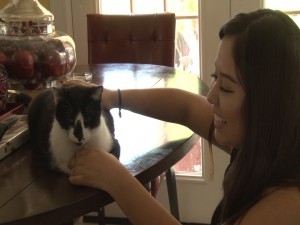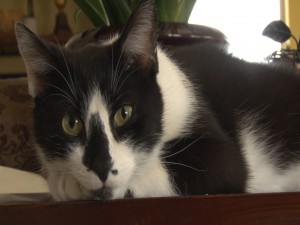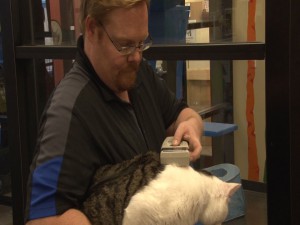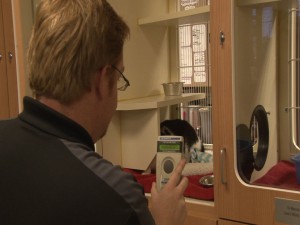- Slug: Microchip pets
- Photos available (thumbnails, captions below)
- Video story available
By ELENA MENDOZA
Cronkite News
CHANDLER – Victoria Tenorio lost Toto, her beloved cat of five years, for an entire year.
Toto’s litterbox was in the garage when a mechanic came to work on Tenorio’s car. Toto escaped.
“He just slipped out and my mom didn’t notice. Then we closed the garage and I think he wasn’t able to find his way back home,” Tenorio said.
One month went by, then three months, then 12. She missed her best friend.
“At first I was really hopeful and then afterwards I was like, ‘Maybe he’s not going to come back home’,” Tenorio said.
Then, 18 months after her house cat left home, Tenorio got an unexpected phone call. She cried.
Stephanie Nichols-Young, president of the Animal Defense League of Arizona, called to tell Tenorio a volunteer found Toto on the opposite side of the Valley, in northwest Glendale.
“Someone trapped him in Glendale and they brought him to the clinic, they scanned for the microchip and he got home,” said Nichols-Young. “It is such a good feeling to make that phone call.”
Because Toto had been microchipped by the Arizona Animal Welfare League when Tenorio adopted him as a kitten, the two animal organizations were able to reunite Toto and his owner in less than 24 hours a month ago.
Michael Morefield, marketing and communications director for the welfare league, encourages owners to get their pets microchipped.
“It is ensuring the highest ability you can to get your pet back to you,” Morefield said. “Collars break and tags can be worn out. Microchips cannot.”
A microchip, about the size of a grain of rice, contains a pet’s unique identification number that can be read by a scanner.
“They should check and ask their vet, ‘Is this a manufacturer that’s widely used? Do you think this company will be around?’” Nichols-Young said. “But there is a universal reader that most shelters and most clinics have so they can read multiple types of microchips.”
Morefield said it takes less than a minute to inject a microchip and anesthesia isn’t required. The organization offers microchip injections for $20.
But owners have to register their pet online and keep contact information, including an address and phone number, updated.
“A lot of people forget to do that final step. The microchipping is really, really important, but if you don’t register that and give them your information, they cannot get that animal back to you,” said Morefield.
Luckily, Tenorio did so.
“If it weren’t for the microchip then Toto wouldn’t be back home. I’m extremely grateful for that,” Tenorio said.
^__=



